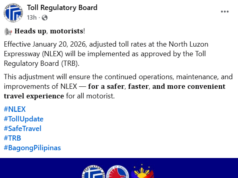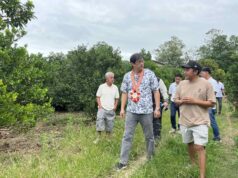ANGELES CITY – “No to VAT on toll fees.”
Doroteo David, a quarry trucker, said the 12 percent value added tax on toll fees will “eat up a substantial portion” of their income from the sand they regularly deliver to Metro Manila.
“Mapipilitan kaming magtaas ng presyo ng buhangin upang mapunan namin ang kakainin ng VAT. Aalma tiyak ang mga suki sa Manila, pero wala kaming magagawa,” David said.
Daily commuters from this city to Manila are bracing themselves for an increase in bus fare.
“Of course, the bus companies will simply pass the cost of the VAT to the passengers. As it is now, we are already greatly burdened by the oil price increases. Then this yet another source of suffering in VAT,” said Mark Manese, a call center agent.
“Dagdag itong pasanin sa aming mga biyahero sa NLEx (North Luzon Expressway) araw-araw,” said a distributor of home-made tocino and longanisa from this city. vendor of David, Manese and the processed meat distributor, along with other motorists, that regularly ply the North Luzon Expressway have found a champion in their fight against the value added tax on toll fees in the author of the very law that supposedly imposed it.
“The heedless imposition of VAT on toll fees will further burden more than 500,000 motorists who use the expressways daily, reeling as they are from the rising prices of commodities,” said former Rep. Renato V. Diaz of Nueva Ecija, author of Republic Act 7716 or the Expanded Value Added Tax.
“The spiralling effect on the prices of goods and services as the result of such a tax on tolls would not only exacerbate the suffering of the majority of our citizens, but would impact negatively on the economy as a whole,” Diaz added.
The Bureau of Internal Revenue has announced that the 12 percent VAT on toll fees in all expressways will start this coming October 1. The basis for this action, the BIR said, is RA 7716.
Diaz now claims that RA 7716 did not expand VAT to include toll fees.
“I dare them to show me any reference to VAT on toll fees in RA 7716,” he challenged the BIR during a chance interview here yesterday.
Senator Ralph Recto, co-author of RA 7716, has expressed a similar stand during a Senate hearing last year conducted by the committee on ways and means which he chaired.
When the BIR released the Revenue Regulations on the VAT on toll fees last year, Diaz, along with Atty. Aurora Timbol, former assistant secretary of the Department of Trade, “fully cognizant of the nature and intent of RA 7716,” filed a case with the Supreme Court – on August 10, 2010 – requesting for a temporary restraining order against the BIR and the Department of Finance which the high court granted.
Last July 19, 2011, the Supreme Court denied the petition of Diaz and Timbol and lifted the TRO.
On August 8, 2011, the petitioners filed a mption for reconsideration along with a request to schedule oral arguments whereby Diaz, as author and sponsor of the E-VAT Law, the Tax Reform Act of 1997 along with amici curae or friends of court will be invited to clarify the economic and other implications of the BIR regulation.
The matter has remained pending with the Supreme Court.
Recto for his part has filed Senate Bill 2914, “clearly stipulating that toll fees are not subject to VAT.
Bills excluding toll fees in the VAT coverage are also being filed at the House of Representatives.
“The power to tax belongs only to the legislature, being representatives of the people and ultimately answerable to them. The BIR may propose taxes but only upon enactment by Congress maye these tax laws be implemented by the BIR,” Diaz clarified.
“The BIR by interpretation came out with a ruling that toll fees is covered by VAT, 17 years after the law was enacted,” Diaz added. “Taxation can only be done by legislation, not by mere interpretation.”
Asked what other options are open to the public who will be adversely affect ted by “this tax on tax” up for implementation this October 1?
Diaz answered: “An appeal to President Aquino not to allow the imposition of the tax on toll fees until the issue is duly examined and resolved by Congress through the passage of a new law. “




